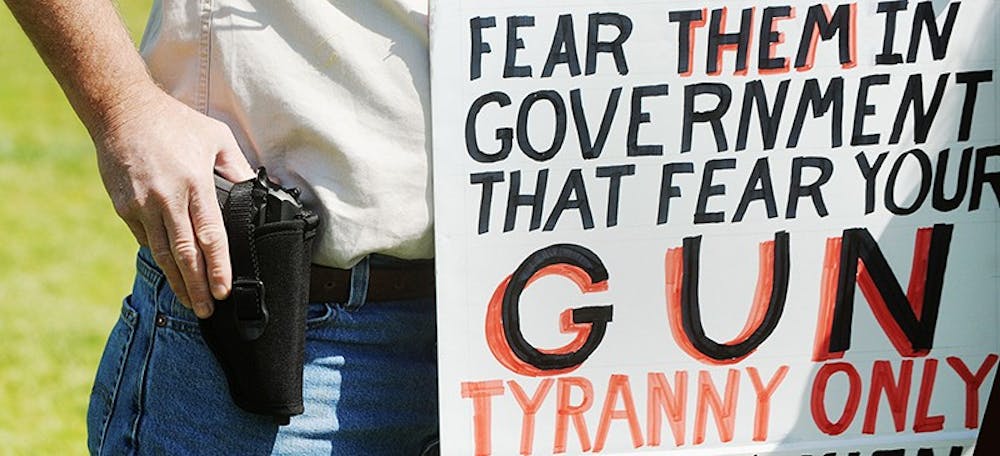The good, sane people of this country are not the ones walking into schools, churches and shopping malls firing at random. All the laws, restrictions and regulations in the world mean nothing to somebody mentally unstable enough to walk in to a school and shoot with no regard for the consequences. These people are not operating off some sort of morality, and they are certainly not playing by the rules of legality. Simply put, gun legislation will not stop them and gun control will not hinder them.
In the wake of the tragic Sandy Hook Elementary School shooting, anti-gun fervor has spread across the United States. Turn on any major news outlet and the issue of gun control is at the forefront of debate among network pundits and panelists alike. While those who are critical of firearms are calling for massive revisions in gun laws, pro-gun lobbyists continue to fight for the right to bear arms. With both sides deadlocked in a war of opposing ideologies, tension remains high as our country moves forward.
Despite the emotional response these shootings elicit, limiting the rights to bear arms is not only fundamentally unconstitutional, but irrational as well. Calls for gun control are not fueled by reason, but pushed forward on emotional and fear-based agendas.
[quote]Stricter gun laws and new gun legislation will do nothing to guarantee the safety of the American people. Instead they will continue to distract from legislation that could create long-term, meaningful change.[/quote]
A major barrier to meaningful change comes from the 24-hour news cycle. By perpetuating fear, the media distract from the real issues. A perfect example of this is how the media have influenced public perception of the frequency of mass shootings and gun crime as a whole.
Despite the perception that mass shootings are becoming more common, the frequency of them is not increasing. Additionally, violent crimes as a whole have sharply declined in the United States during the past two decades, according to FBI crime statistics. In fact, throughout the past five years, gun sales have risen steadily while violent crimes have dropped substantially.
Assault weapons are also garnering negative press. The weapons of choice in these mass murders overwhelmingly have been pistols and revolvers. According to FBI crime statistics, they have been used almost two and a half times as often as assault weapons in mass shootings throughout the past three decades. Last year alone, 300 people were murdered with rifles, but more than 6,000 were killed with handguns. Efforts to target guns as the problem, especially assault rifles, are fundamentally misguided.
As for the dangers of passing new legislation in a period of mourning and high emotion, look no further than the Gun-Free Zone Act of 1990, which created the posting of ‘Gun-Free Zones’ in designated public places. On the surface the signs seemed like a good idea -- no guns in places like schools, malls and churches. In reality, it was an ineffective, counterproductive piece of legislation. Economist John Lott, who conducted a groundbreaking study about mass shootings after Columbine, offered an astounding piece of information about these zones in response to the Newtown shooting.
“With just one single exception, the attack on congresswoman Gabrielle Giffords in Tucson in 2011, every public shooting since at least 1950 in the U.S. in which more than three people have been killed has taken place where citizens are not allowed to carry guns.”
But surely new gun restrictions would keep weapons out of the hands of criminals or at least make it more difficult for them, right? Well no, they would not. Limiting the ability to buy weapons of all kinds through legal pathways does not stop criminals or the mentally ill from acquiring them through illegal channels, as they do now. What it does do, however, is limit the ability for law-abiding citizens to protect themselves.
Addressing the weapons themselves will do virtually nothing to stop another Newtown tragedy. Instead, our country needs to provide easy access to mental health care for people possessing violent tendencies who cannot afford it, do not have access to it and those who are fearful to commit themselves.
In the past three years, more than $4.35 billion of funding for mental health services has been cut across the country. According to the Substance Abuse and Mental Health Services Administration, 40 percent of adults with serious mental illnesses reported not getting any treatment at all, due to the high cost, low availability and lack of insurance coverage.
Also, instead of trying to impose new gun laws, why not focus on better enforcement of those already in place? According to a study by the Americans for Gun Safety Foundation, 20 of the 22 major federal gun statutes are almost completely ignored. The current gun laws are embarrassingly ineffective due to a lack of enforcement. Of an estimated 420,000 guns stolen in a two-year period, federal prosecutors only brought 524 stolen gun charges forward.
In the midst of outcries for change, guns are serving as a convenient scapegoat, distracting from the types of people who are pulling the triggers as well as the plethora of other factors that are at play in any given tragedy. Instead of perpetuating a cycle of misinformation, myth and media buzzwords, choose to look past the hype and discover the truth behind gun control. Reason must prevail over the initial emotional outcry. Facts and logic must serve as the basis of reform, not sentiments of hatred and fear as the result of tragedy.
We fundamentally lack the knowledge to pass any law that will, without doubt, reduce gun violence. What we do have is the power to protect our individual liberties and work for real, meaningful change.


